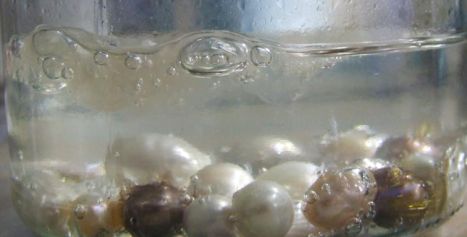
Did you ever accidentally put any pearl in vinegar and lost it? Even if you did not, here is what you should know about the reaction between pearls and vinegar. You might find it strange but pearls actually get dissolved in this simple chemical called vinegar. However, you may not find it strange if you are aware of chemical reactions and the composition of pearls.
Similar to the composition of a limestone or marble, a pearl is also composed of calcium carbonate that is chemically known as CaCO3. When calcium carbonate comes into reaction with vinegar, its chemical bonds are broken. According to chemistry laws, carbonates do react with acids and resultantly form salts and carbon dioxide. If you consider vinegar now, it is nothing but a mild acid. Vinegar contains almost 10 percent of acetic acid.
Thus, pearls that contain carbonates and vinegar that contains acetic acid react with each other. This finally leads to the dissolution of pearls. You may find many such substances like pearls that contain calcium carbonate and dissolve in acidic solutions like vinegar. Even if you try to check it with an eggshell, it will display the same reaction. Thus, the melting of pearls in vinegar is actually its dissolution in this acidic liquid.
You should now be very careful about keeping your expensive pearls away from such liquids that are acidic in nature. While fake pearls may not dissolve in vinegar, you cannot really take a chance with your expensive pearly items. In fact, you may not even find real or natural pearls. Pearl selling companies usually protect them to an extent so these may not be harmed by polluted weather conditions. However, you should still be extra cautious when it is about your costly pearl jewelry. Keep it protected from acidic environments and liquids.